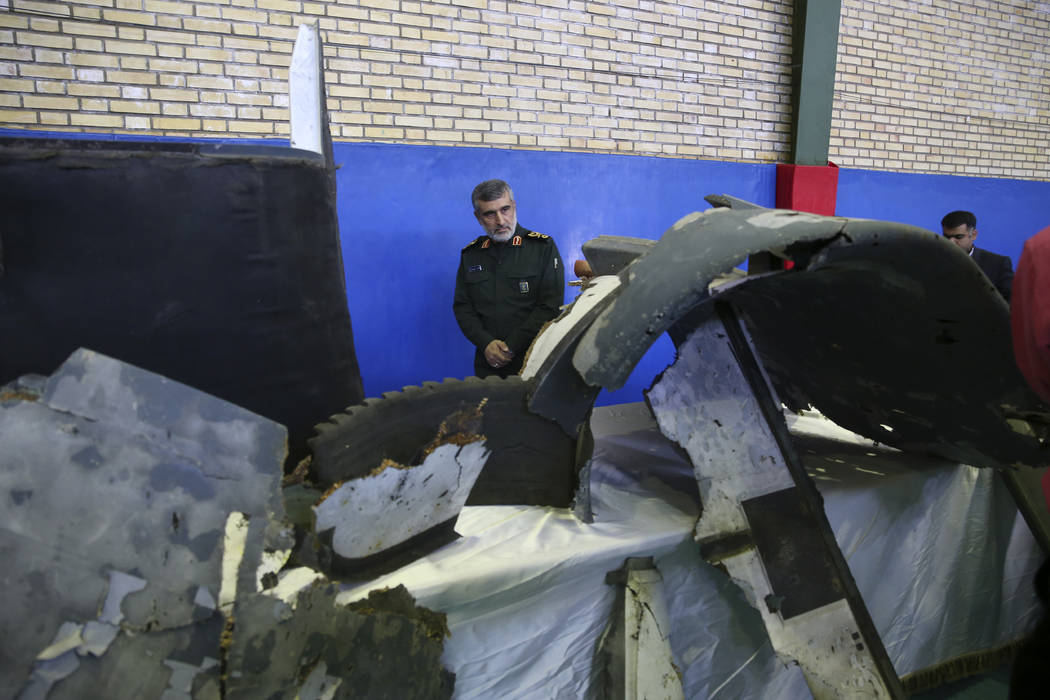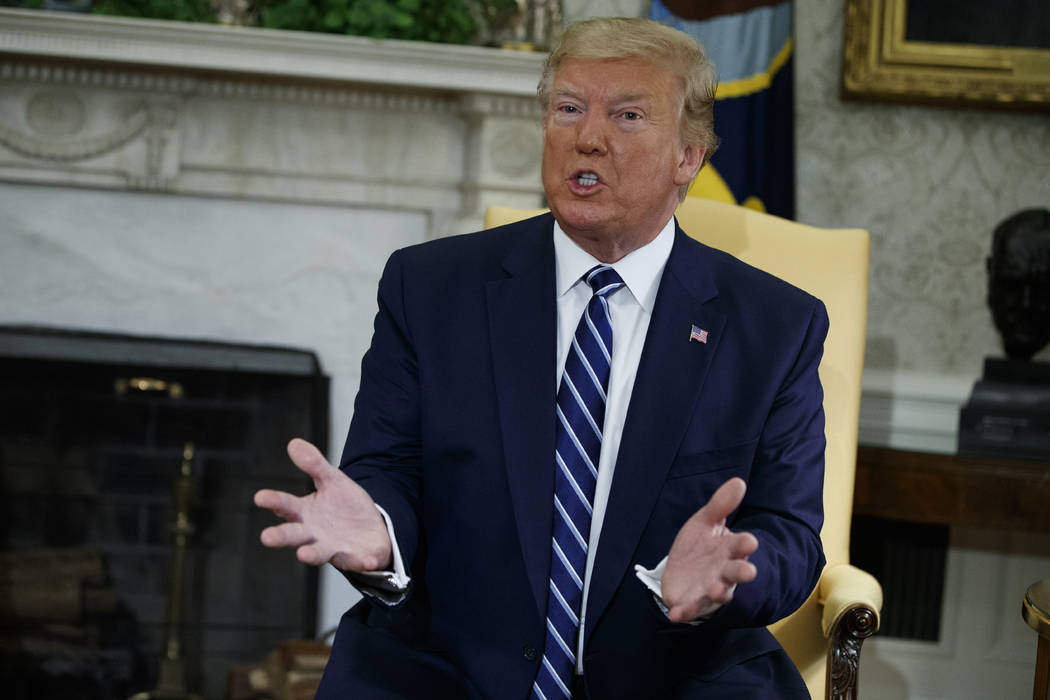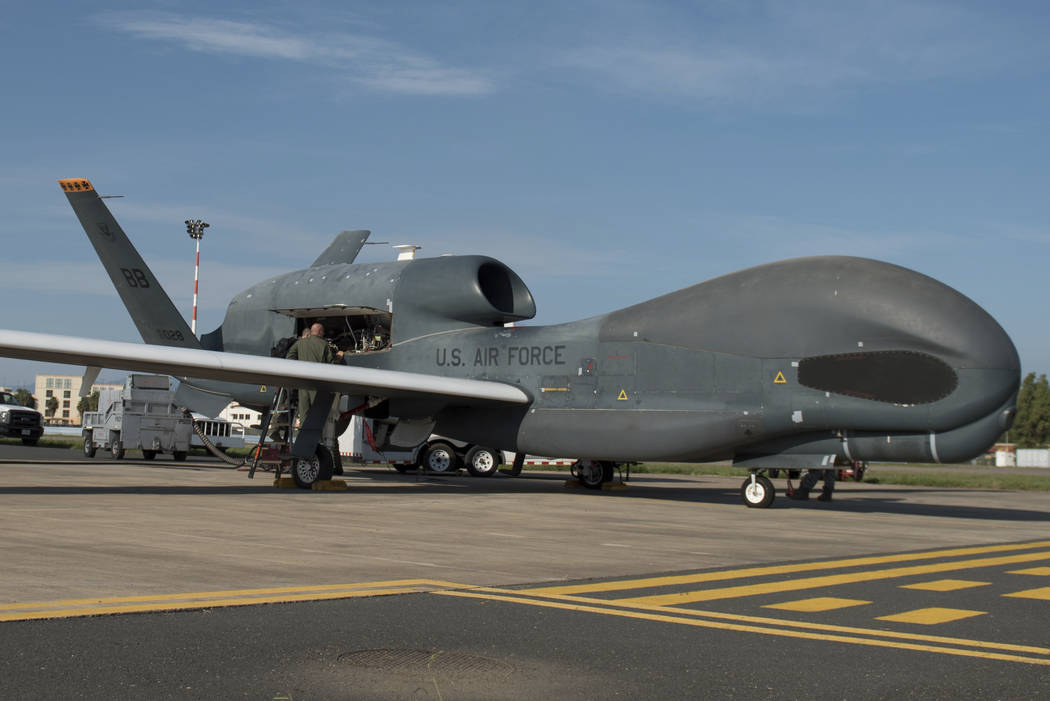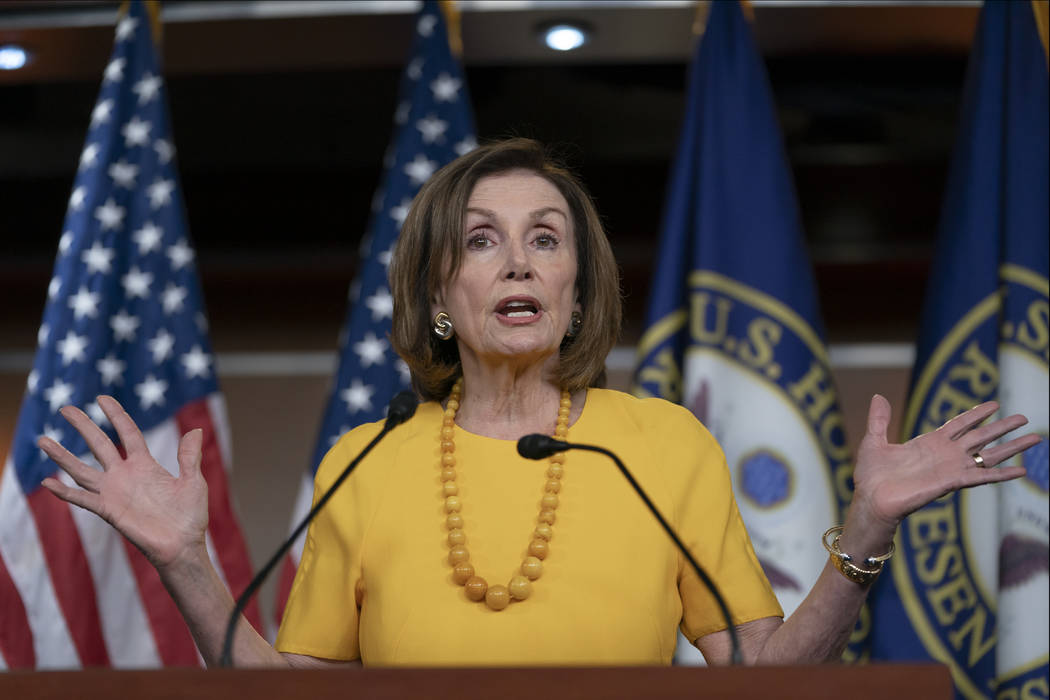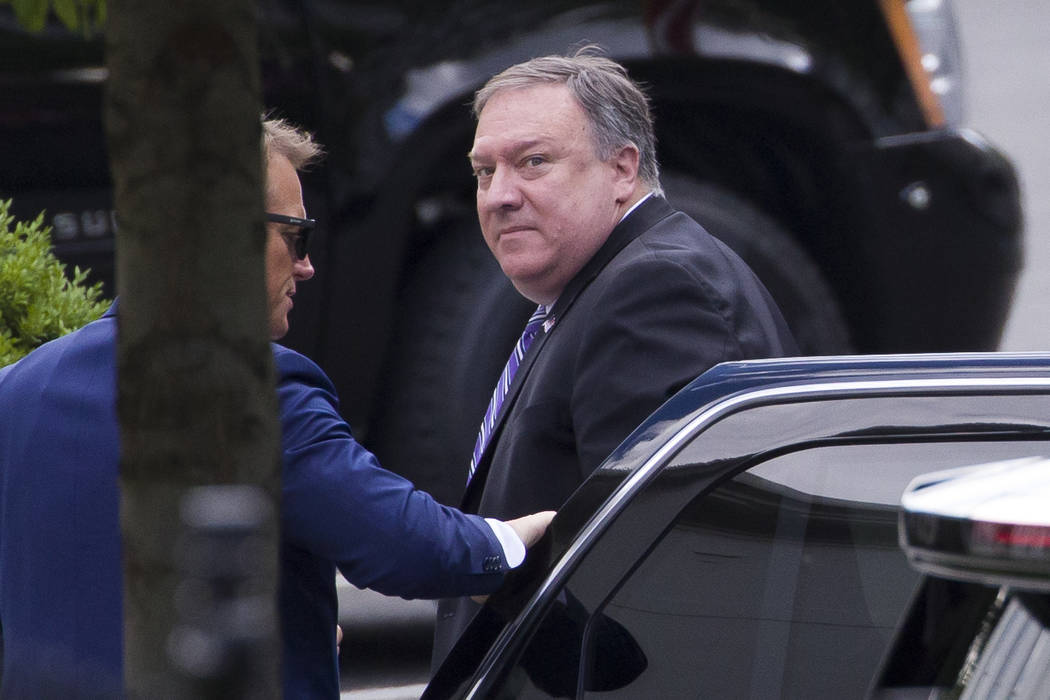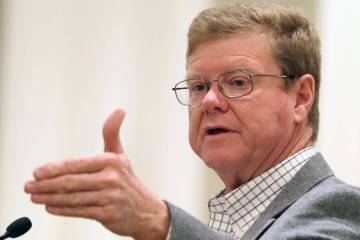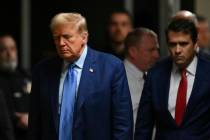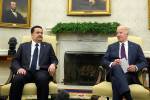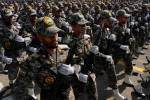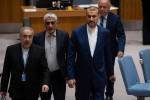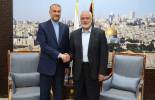Trump says he decided retaliation attack on Iran not proportional
WASHINGTON — President Donald Trump said Friday that the U.S. was “cocked and loaded’ to retaliate against Iran for downing an American drone, but canceled the missile strikes 10 minutes before they were to be executed after being told some 150 people could die.
Trump tweeted Friday that the U.S. will never allow Iran to have a nuclear weapon. But he said he’s in no hurry to respond to the downing of the U.S. surveillance drone over the Strait of Hormuz. His statement was the latest indication that he does not want to escalate the clash with Tehran, but he didn’t rule out a future U.S. strike.
....Death to America. I terminated deal, which was not even ratified by Congress, and imposed strong sanctions. They are a much weakened nation today than at the beginning of my Presidency, when they were causing major problems throughout the Middle East. Now they are Bust!....
— Donald J. Trump (@realDonaldTrump) June 21, 2019
....On Monday they shot down an unmanned drone flying in International Waters. We were cocked & loaded to retaliate last night on 3 different sights when I asked, how many will die. 150 people, sir, was the answer from a General. 10 minutes before the strike I stopped it, not....
— Donald J. Trump (@realDonaldTrump) June 21, 2019
....proportionate to shooting down an unmanned drone. I am in no hurry, our Military is rebuilt, new, and ready to go, by far the best in the world. Sanctions are biting & more added last night. Iran can NEVER have Nuclear Weapons, not against the USA, and not against the WORLD!
— Donald J. Trump (@realDonaldTrump) June 21, 2019
He said U.S. economic sanctions are crippling the Iranian economy and more are being added.
Iran claimed Friday it had issued several warnings before shooting down the drone over what it said was Iranian territory.
Source: US seeks closed Security Council meeting
Diplomats say the United States has asked for a closed Security Council meeting on Monday on recent developments regarding Iran and the latest tanker incidents.
Two well-informed diplomats confirmed the U.S. request on Friday and said the closed consultations are likely to take place on Monday afternoon. They spoke on condition of anonymity because they were not authorized to speak publicly.
UN boss urges dialogue
The U.N. says Secretary-General Antonio Guterres’ message to the United States and Iran is to avoid anything that would escalate the current tense situation and “to have nerves of steel.”
U.N. spokesman Stephane Dujarric told reporters at U.N. headquarters Friday that “the secretary-general firmly believes in the need for dialogue between the parties involved as probably the best way to defuse tension and to avoid any escalation.”
Dujarric said the U.N. has been in contact with the parties at various levels and is passing the same message in public and it is in private, “which is to avoid any escalation.”
Iran: We could have fired on manned spy plane
The head of the Revolutionary Guard’s aerospace division says a manned U.S. spy plane was near the drone it shot down but Iran chose not to target it.
Gen. Amir Ali Hajizadeh made the comment Friday at a news conference attended by The Associated Press in Tehran.
The Guard shot down a U.S. Navy RQ-4A Global Hawk on Thursday.
Hajizadeh said: “At the same moment, another spy aircraft called a P8 was flying close to this drone. That aircraft is manned and has around 35 crew members. Well, we could have targeted that plane, it was our right to do so, and yes it was American, but we didn’t do it. We hit the unmanned aircraft.”
The U.S. military’s Central Command did not immediate respond to a request for comment.
U.S. called off attack
The United States abruptly called off preparations for a military strike against Iran over the downing of a U.S. surveillance drone, a U.S. official said, while Iran claimed Friday it had issued several warnings before shooting down the drone over what it said was Iranian territory.
On Friday, the head of Iran’s Revolutionary Guard’s aerospace division told Iranian state television that Iran had given repeated warnings before launching a missile at the U.S. military surveillance drone.
Gen. Amir Ali Hajizadeh, standing in front of what Iranian authorities described as pieces of the U.S. Navy RQ-4A Global Hawk drone, told state TV that Iranians gave the warnings over radio frequencies that are routinely monitored by drone pilots and the U.S. military. “Unfortunately, they did not answer,” he said.
He added Iran collected the debris from its territorial waters. The U.S. military says that the drone was in international airspace over the Strait of Hormuz when it was shot down.
Recommended by Pentagon
The New York Times separately reported that Trump had approved the strikes Thursday night, but then called them off. The newspaper cited anonymous senior administration officials.
According to the official who spoke to The Associated Press, the strikes were recommended by the Pentagon and were among the options presented to senior administration officials.
It was unclear how far the preparations had gone, but no shots were fired or missiles launched, the official said.
The military operation was called off around 7:30 p.m. Washington time, after Trump had spent most of Thursday discussing Iran strategy with top national security advisers and congressional leaders.
Asked earlier in the day about a U.S. response to the attack, Trump said, “You’ll soon find out.”
The downing of the U.S. drone — an unmanned aircraft — over the Strait of Hormuz prompted accusations from the U.S. and Iran about who was the aggressor. Iran insisted the drone violated Iranian airspace; Washington said it had been flying over international waters.
Trump’s mixed signals
Trump’s initial comments on the attack were succinct. He declared in a tweet that “Iran made a very big mistake!” But he also suggested that shooting down the drone — which has a wingspan wider than a Boeing 737 — was a foolish error rather than an intentional escalation, suggesting he may have been looking for some way to avoid a crisis.
“I find it hard to believe it was intentional, if you want to know the truth,” Trump said at the White House. “I think that it could have been somebody who was loose and stupid that did it.”
Trump, who has said he wants to avoid war and negotiate with Iran over its nuclear ambitions, cast the shootdown as “a new wrinkle … a new fly in the ointment.” Yet he also said “this country will not stand for it, that I can tell you.”
He said the American drone was unarmed and unmanned and “clearly over international waters.” It would have “made a big, big difference” if someone had been inside, he said.
But fears of open conflict shadowed much of the discourse in Washington. As the day wore on, Trump summoned his top national security advisers and congressional leaders to the White House for an hour-long briefing in the Situation Room. Attendees included Secretary of State Mike Pompeo, national security adviser John Bolton, CIA Director Gina Haspel, Joint Chiefs Chairman Gen. Joseph Dunford, acting Defense Secretary Patrick Shanahan and Army Secretary Mark Esper, whom Trump has said he’ll nominate as Pentagon chief.
Caution urged from many
Pompeo and Bolton have advocated hardline policies against Iran, but Rep. Adam Schiff, the chairman of the House intelligence committee, said “the president certainly was listening” when congressional leaders at the meeting urged him to be cautious and not escalate the already tense situation.
On Capitol Hill, leaders urged caution, and some lawmakers insisted the White House must consult with Congress before taking any actions.
House Speaker Nancy Pelosi said no specific options for a U.S. response were presented at the meeting. Senate Majority Leader Mitch McConnell said, “The administration is engaged in what I would call measured responses.” And late Thursday, House Republicans on the Foreign Affairs, intelligence and Armed Services committees issued a statement using the same word, saying, “There must be a measured response to these actions.”
Pressure for more than a year
The Trump administration has been putting increasing economic pressure on Iran for more than a year. It reinstated punishing sanctions following Trump’s decision to pull the U.S. out of an international agreement intended to limit Iran’s nuclear program in exchange for relief from earlier sanctions.
Citing Iranian threats, the U.S. recently sent an aircraft carrier to the Persian Gulf region and deployed additional troops alongside the tens of thousands already there. All this has raised fears that a miscalculation or further rise in tensions could push the U.S. and Iran into an open conflict 40 years after Tehran’s Islamic Revolution.
The paramilitary Guard, which answers only to Supreme Leader Ayatollah Ali Khamenei, said it shot down the drone at 4:05 a.m. Thursday when it entered Iranian airspace near the Kouhmobarak district in southern Iran’s Hormozgan province. Kouhmobarak is about 750 miles southeast of Tehran.
Air Force Lt. Gen. Joseph Guastella, commander of U.S. Central Command air forces in the region, disputed that contention, telling reporters that the aircraft was 34 kilometers (21 miles) from the nearest Iranian territory and flying at high altitude when struck by a surface-to-air missile. The U.S. military has not commented on the mission of the remotely piloted aircraft that can fly higher than 10 miles in altitude and stay in the air for more than 24 hours at a time.
“This attack is an attempt to disrupt our ability to monitor the area following recent threats to international shipping and free flow of commerce,” he said.
Airlines rerouting flights
Late Thursday, the Federal Aviation Administration barred American-registered aircraft from flying over parts of the Persian Gulf and the Gulf of Oman and several major airlines from around the world on Friday began rerouting their flights to avoid the area, including British Airways, Australia’s Qantas, Germany’s Lufthansa and the Dutch carrier KLM.
Democratic leaders in particular urged the president to work with U.S. allies and stressed the need for caution to avoid any unintended escalation.
Sen. Chuck Schumer of New York said he told Trump that conflicts have a way of escalating and “we’re worried that he and the administration may bumble into a war.”
Vatican urges restraint
A Vatican cardinal is begging the U.S. and Iran to step back from escalating tensions in the Persian Gulf, calling instead for political friendship.
In a tweet Friday, Ghanaian Cardinal Peter Turkson wrote: “On our knees, let’s pray USA & IRAN do not unsheathe the weapons of war!” He followed it by tweeting: “Let nations cultivate political friendship and not mutual demonization. The former builds peace, the latter kills it.”
Let nations cultivate political friendship and not mutual demonization. The former builds peace. The latter kills it.
— Card Peter K Turkson (@CardinalTurkson) June 20, 2019
Turkson heads the Holy See’s development and migrant department, and long headed the Vatican office of justice and peace.
EU denies being too passive
European Council President Donald Tusk is denying that the EU has been too passive in its response to rising tensions between the United States and Iran.
After chairing a summit of EU leaders in Brussels Friday, Tusk said that “sometimes it’s better not to intervene. The biggest problems in our history (were) always provoked by too active politics, not too passive.”
Tusk says the leaders “follow the situation closely and are very concerned about the developments in the Gulf region.”
But he says there was “no reason to prepare a specific European statement on this” at the summit.
The EU is urging restraint on both sides and the bloc’s top diplomat is in regular contact with the two. The EU is struggling to uphold the Iran nuclear deal, which is at risk of collapse due to U.S. sanctions.
————
Associated Press writers Jill Colvin, Lisa Mascaro and Matthew Lee in Washington, Jon Gambrell in Dubai, United Arab Emirates, and AP video producer Padmananda Rama contributed to this report.



